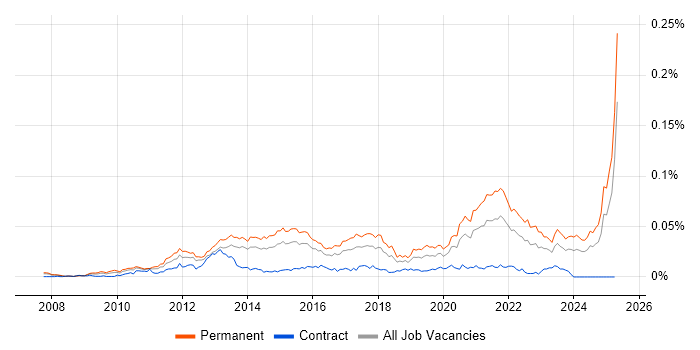SaaS Developer
UK > England
The median SaaS Developer salary in England is £60,000 per year, according to job vacancies posted during the 6 months leading to 16 May 2025.
The table below provides salary benchmarking and summary statistics, comparing them to the same period in the previous two years.
| 6 months to 16 May 2025 |
Same period 2024 | Same period 2023 | |
|---|---|---|---|
| Rank | 646 | 822 | 884 |
| Rank change year-on-year | +176 | +62 | +183 |
| Permanent jobs requiring a SaaS Developer | 45 | 21 | 30 |
| As % of all permanent jobs advertised in England | 0.091% | 0.024% | 0.034% |
| As % of the Job Titles category | 0.10% | 0.026% | 0.037% |
| Number of salaries quoted | 32 | 18 | 26 |
| 10th Percentile | - | £42,000 | £41,875 |
| 25th Percentile | £57,500 | £49,750 | £49,063 |
| Median annual salary (50th Percentile) | £60,000 | £55,000 | £78,750 |
| Median % change year-on-year | +9.09% | -30.16% | +110.00% |
| 75th Percentile | £70,000 | £72,813 | £100,000 |
| 90th Percentile | - | £75,750 | £106,250 |
| UK median annual salary | £60,000 | £55,000 | £75,000 |
| % change year-on-year | +9.09% | -26.67% | +100.00% |
All Permanent IT Job Vacancies
England
For comparison with the information above, the following table provides summary statistics for all permanent IT job vacancies in England. Most job vacancies include a discernible job title that can be normalized. As such, the figures in the second row provide an indication of the number of permanent jobs in our overall sample.
| Permanent vacancies in England with a recognized job title | 44,665 | 81,175 | 81,176 |
| % of permanent jobs with a recognized job title | 90.78% | 94.55% | 91.50% |
| Number of salaries quoted | 24,293 | 60,496 | 51,517 |
| 10th Percentile | £30,000 | £28,500 | £32,500 |
| 25th Percentile | £41,250 | £38,250 | £45,000 |
| Median annual salary (50th Percentile) | £57,000 | £53,500 | £60,800 |
| Median % change year-on-year | +6.54% | -12.01% | +1.33% |
| 75th Percentile | £75,000 | £71,250 | £82,500 |
| 90th Percentile | £97,500 | £90,519 | £100,000 |
| UK median annual salary | £56,000 | £52,500 | £60,000 |
| % change year-on-year | +6.67% | -12.50% | - |
SaaS Developer
Job Vacancy Trend in England
Job postings that featured SaaS Developer in the job title as a proportion of all IT jobs advertised in England.

SaaS Developer
Salary Trend in England
3-month moving average salary quoted in jobs citing SaaS Developer in England.
SaaS Developer
Salary Histogram in England
Salary distribution for jobs citing SaaS Developer in England over the 6 months to 16 May 2025.
SaaS Developer
Job Locations in England
The table below looks at the demand and provides a guide to the median salaries quoted in IT jobs citing SaaS Developer within the England region over the 6 months to 16 May 2025. The 'Rank Change' column provides an indication of the change in demand within each location based on the same 6 month period last year.
| Location | Rank Change on Same Period Last Year |
Matching Permanent IT Job Ads |
Median Salary Past 6 Months |
Median Salary % Change on Same Period Last Year |
Live Jobs |
|---|---|---|---|---|---|
| Midlands | - | 24 | £60,000 | - | 6 |
| East Midlands | - | 15 | £60,000 | - | 4 |
| London | +112 | 11 | £65,000 | +26.21% | 1 |
| West Midlands | - | 9 | £60,000 | - | 2 |
| South East | +102 | 5 | £72,500 | +31.82% | 3 |
| North of England | +44 | 4 | £70,000 | +16.67% | 3 |
| North West | +2 | 3 | £70,000 | +33.33% | 3 |
| Yorkshire | +68 | 1 | £60,000 | - | |
| East of England | +42 | 1 | £85,000 | +13.33% | |
| SaaS Developer UK |
|||||
SaaS Developer Skill Set
Top 30 Co-occurring Skills and Capabilities in England
For the 6 months to 16 May 2025, SaaS Developer job roles required the following skills and capabilities in order of popularity. The figures indicate the absolute number co-occurrences and as a proportion of all permanent job ads across the England region featuring SaaS Developer in the job title.
|
|
SaaS Developer Skill Set
Co-occurring Skills and Capabilities in England by Category
The follow tables expand on the table above by listing co-occurrences grouped by category. The same employment type, locality and period is covered with up to 20 co-occurrences shown in each of the following categories:
|
|
||||||||||||||||||||||||||||||||||||||||||||||||||||||||||||||||||||||||||||||||||||
|
|
||||||||||||||||||||||||||||||||||||||||||||||||||||||||||||||||||||||||||||||||||||
|
|
||||||||||||||||||||||||||||||||||||||||||||||||||||||||||||||||||||||||||||||||||||
|
|
||||||||||||||||||||||||||||||||||||||||||||||||||||||||||||||||||||||||||||||||||||
|
|
||||||||||||||||||||||||||||||||||||||||||||||||||||||||||||||||||||||||||||||||||||
|
|
||||||||||||||||||||||||||||||||||||||||||||||||||||||||||||||||||||||||||||||||||||
|
|
||||||||||||||||||||||||||||||||||||||||||||||||||||||||||||||||||||||||||||||||||||
|
|
||||||||||||||||||||||||||||||||||||||||||||||||||||||||||||||||||||||||||||||||||||
